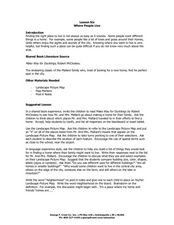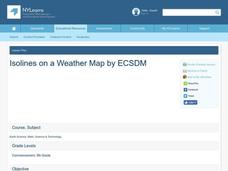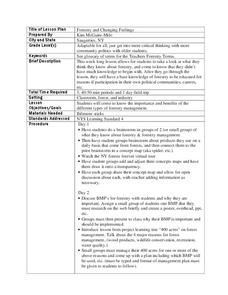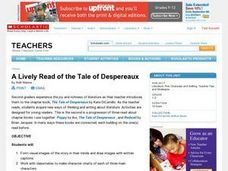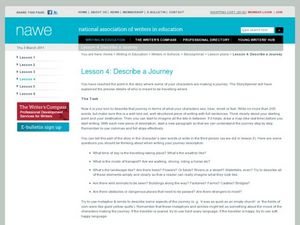Curated OER
Lesson Six Where People Live
Students investigate where people live. In this early geography lesson, students read Make Way for Ducklings! by Robert McCloskey and then discuss what neighborhoods are as they identify them on landscape picture maps.
Curated OER
Isolines on a Weather Map
Ninth graders explore weather by analyzing maps. In this temperature lesson, 9th graders view black and white weather maps of locations in which the weather changes often. Students identify the isolines used on the maps and utilize the...
Curated OER
Forestry and Changing Feelings
Students investigate how the forest affects their daily lives by creating a concept map. In this ecological lesson, students create a concept map linking the forest to the many things they use each day. Students take a field trip in...
Curated OER
Arthur's Nose
Students read a story and complete a story map. In this diversity and acceptance lesson plan, students read Arthur's Nose, make a story map, research Aardvarks, complete a Venn Diagram comparing Arthur's nose to other animals in the...
Curated OER
Railroad Idioms Art Lesson Plan
Sixth graders research railroad idioms. In this idiom lesson, 6th graders read through a glossary of different railroad idioms and their meanings. They illustrate a chosen idiom.
Curated OER
Lewis and Clark
Fifth graders use the Internet to research a topic. In this expeditions lesson, 5th graders answer questions about Lewis and Clark based on the movie they watched previously, use the Internet to research Lewis and Clark, write a journal...
Curated OER
Lively Read of the Tale of Despereaux
Students create a character map of the main characters in The Tale of Despereaux. After reading the text, students create a character chart based on information they gleaned from the story. They use this information to write a letter...
Curated OER
Is the Hudson River Too Salty to Drink?
Students explore reasons for varied salinity in bodies of water. In this geographical inquiry lesson, students use a variety of visual and written information including maps, data tables, and graphs, to form a hypothesis as to why the...
EngageNY
Tracing and Evaluating Arguments: “The Future of Water” and The Big Thirst
Can scholars predict the future? They try as they first watch the video The Future of Water to capture details and trace the argument. Next, individuals complete the Tracing an Argument
note catcher to guide their thoughts. To finish,...
Curated OER
A Differentiated Way through Think Dots
Students examine reasons that led people to explore, identify "West" as defined following Revolutionary War, explain importance of finding natural resources, develop time line of dates and events leading up to Lewis and Clark Expedition,...
Curated OER
Four Color Map
Young scholars explore geometry by completing a color puzzle. For this shape identification lesson, students utilize deductive reasoning to complete a Google SketchUp puzzle with trapezoid, triangles and rectangular shapes. Young...
Curated OER
Number the Stars, Lesson 3
Students consider how an author creates a feeling of suspense in a reader's mind. They analyze characters in the story. Students make a character map for Peter. They discuss how suspense unfolds in the novel Number the Stars.
Curated OER
Shorten the Length
Learn how to summarize by identifying main ideas and supporting details. Readers cross out unimportant information as they read through a text. Is it a random detail? Cross it out! They then draw a concept map, placing the main idea in...
Curated OER
Reading a Map
Third graders become familiar with the vocabulary and skills related to mapping. For this guided reading lesson, 3rd graders find proper nouns on from the map. Students read Goldilocks. Students make a map of their room.
Curated OER
Writing Classroom Agreements using Inspiration & Word to Go
How can you foster a thoughtful learning community for your class? First, the class brainstorms a list of behaviors that will help make the classroom a great place to learn. Then learners group similar ideas together and come up with...
Curated OER
The History of the Pencil
Students research and write about the pencil. They organize the research using concept maps and write an essay using the writing process.
The New York Times
Making Do: Learning and Growing Through Adversity
What is it that makes people keep going when they face challenges in life? Ask your class to consider this question in relation to their own experiences and as they read material from The New York Times. Using personal experiences and...
While They Watched
Teaching the Holocaust
What is the difference between prejudice and discrimination? Between collaborators and bystanders? Guilt and responsibility? Prompt learners to think critically about a very complex and textured topic with an innovative packet of materials.
Schools Linking Network & Lifeworlds Learning
How Do We All Live Together?
Explore the concepts of community and point of view with these activities complementing the children's book Voices in the Park by Anthony Browne. Following a class reading of the story, ask students to either draw a map of the...
Roald Dahl
The Twits - The Wormy Spaghetti
What do spiders' legs and an octopus's eyeball have to do with metaphors? The fourth lesson plan in an 11-part unit designed to accompany The Twits by Roald Dahl uses disgusting foods to teach about metaphoric writing.
Curated OER
Describe a Journey
Students describe the sensory experience of a character's journey in an essay. In this precise details writing lesson, students explain the effects on the senses of weather, time of day, landscape, and other experiences. Students use...
Curated OER
Hunters and Gatherers
Sixth graders participate in mapping and other activities to understand why ancient civilizations developed as they did. In this ancient civilization lesson, 6th graders recognize that there were three important climate zones and...
Curated OER
Oceans: A Sensory Haiku
Students create an ocean haiku. In this haiku lesson, students use their five senses to write a haiku. Students watch videos about the ocean, make a sensory portrait, and create a class haiku.
Curated OER
Biology Project: Gone Fishing
Students write a scientific article using data and prediction skills. In this scientific writing lesson, students access data about fishing off the coast of New Jersey. They look at satellite data, fluorometry and CTD data over a 3 -4...


